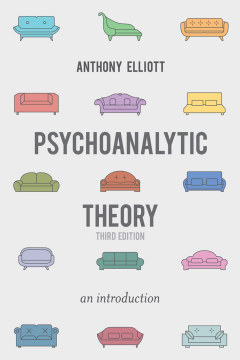
Additional Information
Book Details
Abstract
Influential, exciting and often controversial, psychoanalytic theory has had a major impact in the humanities and social sciences.
In a new edition of this classic book, Anthony Elliott masterfully introduces the reader to psychoanalytic theory. He provides lucid interpretations of key theorists, as well as exploring their impact on society, culture and politics.
Psychoanalytic Theory: An Introduction
• discusses leading psychoanalytic theorists - from Freud to Lacan, Klein to Kristeva, Žižek to Laplanche;
• examines the political and cultural dimensions of psychoanalytic studies, from feminism to postmodernism;
• contains new material on Lacanian and post-Lacanian theory, the post-Kleinian psychoanalyst Wilfred Bion, psychoanalytic feminism and deconstructive psychoanalysis.
Written by one of the world's leading social theorists, this engaging and influential text is essential reading for anyone wanting to learn about psychoanalytic theory and its cultural importance in our lives.
"Elliott's accessible prose and lively style combined with the huge breadth of his knowledge of the field make for a timely new edition of his widely read Psychoanalytic Theory: An Introduction. Elliott's focus is our complex subjectivity, understood both in terms of its personal location and those subjective phenomena which transcend the self. With coverage of new developments in psychoanalytic studies and additional profiles of figures such as Žižek and Butler, this book provides nourishing Bionic food for thought." - Paul Hoggett, Emeritus Professor of Social Policy, University of the West of England, UK
"This is an exceptionally lucid, learned and comprehensive examination of the richly diverse field of psychoanalysis in the twentieth and twenty-first centuries. Elliott makes the case for the continuing relevance of psychoanalysis to the humanities and social sciences by demonstrating the linkages between psyche, politics and culture in each major strand of psychoanalytic theory since Freud. A truly impressive achievement!" - Madelon M. Sprengnether, Regents Professor, Department of English, University of Minnesota, USA
This comprehensive introduction to psychoanalytic theory and its application to the social sciences and humanities is now available in a new and fully revised edition. Elliott provides lucid interpretations of key psychoanalytic theorists and examines the political and cultural dimensions of psychoanalytic studies.
Anthony Elliott is Director of the Hawke Research Institute and Research Professor of Sociology at the University of South Australia. A prominent social theorist, sociologist and public intellectual, he is the author and editor of 40 books, translated in over a dozen languages.
Table of Contents
| Section Title | Page | Action | Price |
|---|---|---|---|
| Cover | Cover | ||
| Contents | vii | ||
| List of tables | viii | ||
| Preface to the Third Edition | ix | ||
| Introduction | 1 | ||
| 1 The Making of the Self: Divergences in Psychoanalytic Theory | 8 | ||
| 2 Modern Culture and Its Repressed: From Freud to Lasch | 37 | ||
| 3 Object Relations, Kleinian Theory, Self-Psychology: From Erikson to Kohut | 63 | ||
| 4 Post-structuralist Anxiety: Subjects of Desire – From Lacan to Derrida | 100 | ||
| 5 Psychoanalytic Feminism: From Chodorow to Butler | 124 | ||
| 6 The Dislocating World of Postmodernity: Identity in Troubled Times | 155 | ||
| Conclusion: Psychoanalysis as Critical Social Science | 179 | ||
| Notes | 185 | ||
| Introductory Reading | 191 | ||
| Further Reading | 192 | ||
| Index | 198 |
